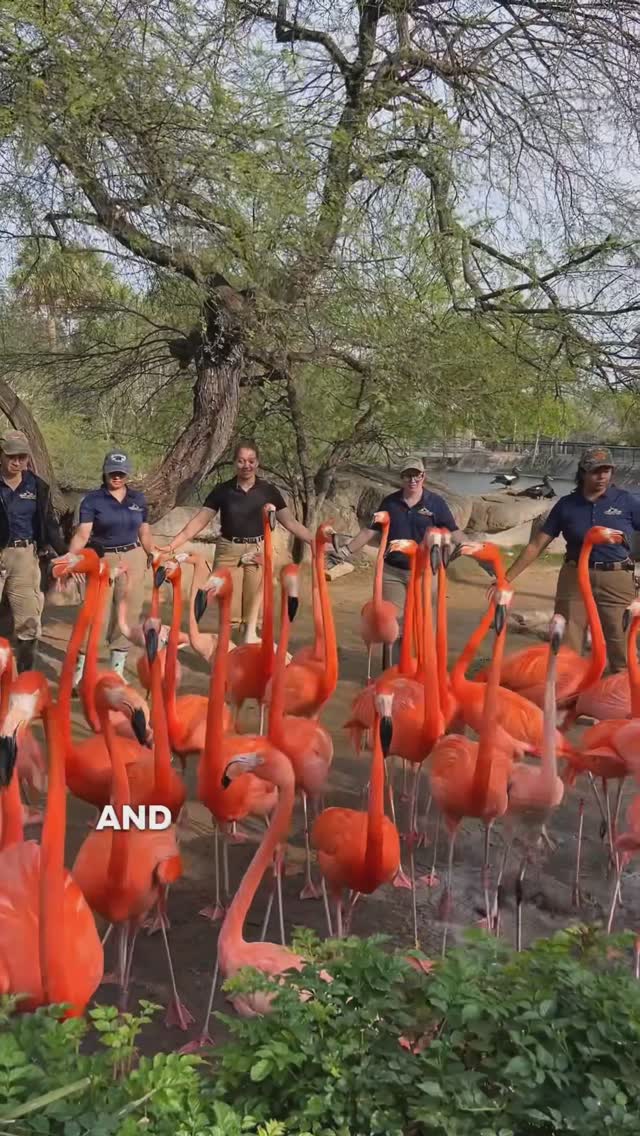- The purpose and logistics of the annual flamingo roundup and its significance in wildlife management and conservation.
- Roles and collaborative efforts of the Bird, Veterinary, and Aquatic Departments in the flamingo roundup.
- Benefits of cross-training among departments in wildlife management operations.
- Scientific insights on flamingo health assessments, monitoring, and conservation practices.
- Engagement strategies for the public and educational aspects around the flamingo roundup event.
The annual flamingo roundup is a key conservation event, carefully planned and executed with precision every year at our institution. This gathering serves as an essential practice for managing flamingo populations within the zoo environment, ensuring their health and well-being while providing invaluable data for ongoing research and conservation efforts. Orchestrating this complex operation involves logistical challenges and meticulous planning to guarantee the safety and health of the flamingos. This effort reflects our commitment to wildlife management and contributes significantly to the global understanding of these fascinating birds.
Central to this event is the collaboration between the Bird Department, Veterinary Department, and the special guests from the Aquatic Department. Each of these departments plays a crucial role in the success of the flamingo roundup. The Bird Department offers specialized knowledge on flamingo behavior and care, ensuring that the capture and handling of these birds are carried out in a humane and effective manner. Their expertise is crucial in minimizing stress and ensuring the birds’ safety during the process.
The Veterinary Department performs vital health assessments during the roundup. Every flamingo undergoes a thorough examination, including weight checks, blood sampling, and parasite screening. These health assessments provide a snapshot of the population’s overall health and contribute to determining the effectiveness of ongoing health and dietary programs. Such diligent procedures help us maintain and potentially improve the welfare standards for our flamingo populations.
Our colleagues from the Aquatic Department bring a unique perspective to the event. Although their primary expertise lies in managing aquatic species, their involvement in the flamingo roundup introduces a cross-disciplinary approach that enhances the overall effectiveness of our operations. By engaging in tasks outside their usual scope, the staff gains insights and experiences that contribute to a more versatile team. Cross-training across departments not only fosters a better understanding of different species and habitats but also encourages innovation in problem-solving and enriches the professional development of all staff involved.
Perhaps most importantly, the annual flamingo roundup is a significant opportunity for scientific inquiry and research. Monitoring flamingo health through detailed records on each bird enables us to track changes over time, investigate the factors affecting their well-being, and implement strategies to address any issues. The data collected during these roundups also plays a role in larger conservation efforts, helping us understand the impact of the changing environment on flamingo populations both within the zoo and in the wild.
Public engagement is another key element of the flamingo roundup. By involving the community, we aim to raise awareness about the importance of conservation and the measures being taken to preserve species diversity. Educational programs and guided tours during the event allow visitors to gain insight into the behind-the-scenes operations of zoo management. This engagement not only informs but also inspires a new generation of conservationists, highlighting the interconnectedness of ecosystems and species.
Our institution recognizes the annual flamingo roundup as more than just a routine task. It is a dynamic component of our broader conservation objectives. Through the collaborative efforts of our Bird, Veterinary, and Aquatic Departments, we strive to uphold the highest standards of animal care, contribute to scientific knowledge, and engage the public in meaningful conservation dialogue. The continuity and evolution of this practice reflect our ongoing commitment to the stewardship of wildlife and the continuous improvement of our conservation practices.
*****
Source Description
The annual flamingo roundup ft. our Bird Dept., Veterinary Dept, and special guests, the Aquatic Dept.
(Because cross-training is always a good idea!)


